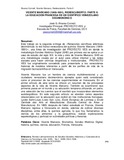| dc.rights.license | http://creativecommons.org/licenses/by-nc-sa/3.0/ve/ | es_VE |
| dc.contributor.author | Álvarez Cornett, José G. | |
| dc.date.accessioned | 2021-10-09T02:27:48Z | |
| dc.date.available | 2021-10-09T02:27:48Z | |
| dc.date.issued | 2021-10-08 | |
| dc.identifier.issn | ISSN 2244-7008 | es |
| dc.identifier.uri | http://www.saber.ula.ve/handle/123456789/47659 | |
| dc.description.abstract | Este trabajo es la segunda entrega de «Relaciones científicas atlánticas decimónicas: la red franco-venezolana del químico Vicente Marcano (1848-1891)», una línea de investigación del PROYECTO VES en donde la metodología Sondeo Histórico Digital (SHD) por primera vez se aplica a un caso de estudio del siglo XIX: la vida y obra de Vicente Marcano. SHD es una metodología creada por el autor para utilizar internet y las redes sociales para hacer crónicas biográficas e institucionales. PROYECTO VES fue originalmente concebido para presentarle a los venezolanos historias de modelos referentes a partir de los perfiles de vida de la migración tecnocientífica en Venezuela. Vicente Marcano fue un hombre de ciencia multidimensional y un ciudadano venezolano decimonónico ejemplar quien está considerado como el precursor de las ciencias experimentales en Venezuela. En el primer artículo de esta serie se ofreció un resumen de los principales aspectos de la vida de Vicente Marcano. También se examinaron sus primeros pasos en el mundo y su educación temprana utilizando, en parte, una selección de los cuentos que él escribió que incorporaban elementos autobiográficos. En este segundo artículo se abordan varios aspectos relacionados con la educación que recibió en tres instituciones francesas: Lycée Saint-Louis (Liceo San Luis), École Duvignau de Lanneau y École Centrale des Arts et Manufactures (Escuela Central de Artes y Manufactura). En 1869, después de haber estudiado en Francia, Vicente Marcano regresa a Venezuela en donde, además de cultivar diversas disciplinas, entre ellas, la química agrícola, lo que hoy llamaríamos la ciencia de los alimentos y la geoquímica, realizó exploraciones espeleológicas y participó en actividades políticas y literarias. | es_VE |
| dc.language.iso | es | es_VE |
| dc.publisher | SaberULA | es_VE |
| dc.rights | info:eu-repo/semantics/openAccess | es_VE |
| dc.subject | Vicente Marcano | es_VE |
| dc.subject | Bromelina | es_VE |
| dc.subject | Sondeo Histórico Digital | es_VE |
| dc.subject | historia | es_VE |
| dc.subject | química | es_VE |
| dc.subject | ciencia | es_VE |
| dc.subject | educación | es_VE |
| dc.subject | Francia | es_VE |
| dc.subject | Venezuela | es_VE |
| dc.title | Vicente Marcano (1848-1891), redescubierto. Parte II:La educación francesa de un científico venezolano decimonónico | es_VE |
| dc.type | info:eu-repo/semantics/article | es_VE |
| dcterms.dateAccepted | 31/03/2020 | es |
| dcterms.dateSubmitted | 09/11/2019 | es |
| dc.description.abstract1 | This paper is the second installment of «Relaciones científicas atlánticas decimónicas: la red franco-venezolana del químico Vicente Marcano (1848-1891)» («Nineteenth-Century Atlantic Scientific Relations: The Franco-Venezuelan Network of Chemist Vicente Marcano (1848-1891)», a research line of VES PROJECT where the Digital Historical Sounding (DHS) methodology has been applied for the first time to a nineteenth-century case study – the life and work of Vicente Marcano. DHS is a methodology created by the author to use the Internet and social media networks to make biographical and institutional profiles. VES PROJECT was originally designed to present to the Venezuelan people with role models stories based on the life profiles of migrant STEM professionals in Venezuela. Vicente Marcano was a multidimensional man of science and a nineteenth-century exemplary Venezuelan citizen who is considered the forefather of experimental sciences in Venezuela. The first article in this series provided a summary of the main aspects of Vicente Marcano's life. By relying, in part, on several of his short stories incorporating autobiographical elements, we also examined his first steps in the world and his early education. In this second paper, we study several aspects of his education at three French institutions: Lycée Saint-Louis, École Duvignau de Lanneau, and École Centrale des Arts et Manufactures. In 1869, after studying in France, Vicente Marcano returns to Venezuela where, in addition to cultivating different disciplines, including agricultural chemistry, what we today would call food science, and geochemistry, he carried out speleological explorations and took part in political and literary activities. | es_VE |
| dc.description.colacion | 3-68 | es_VE |
| dc.description.email | josecornett2000@marshall.usc.edu | es_VE |
| dc.description.frecuencia | Semestral | es |
| dc.description.paginaweb | http://www.saber.ula.ve/bitacora-e/ | es |
| dc.publisher.pais | Venezuela | es_VE |
| dc.subject.institucion | Universidad de Los Andes | es_VE |
| dc.subject.keywords | Vicente Marcano | es_VE |
| dc.subject.keywords | Bromelain | es_VE |
| dc.subject.keywords | Digital Historical Sounding | es_VE |
| dc.subject.keywords | history | es_VE |
| dc.subject.keywords | chemistry | es_VE |
| dc.subject.keywords | science | es_VE |
| dc.subject.keywords | education | es_VE |
| dc.subject.keywords | France | es_VE |
| dc.subject.keywords | Venezuela | es_VE |
| dc.subject.seccion | Bitácora-e: Artículos | es_VE |
| dc.subject.tipo | Revistas | es_VE |
| dc.type.media | Texto | es_VE |


